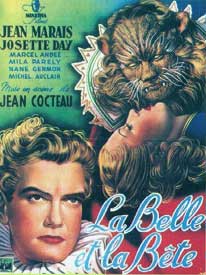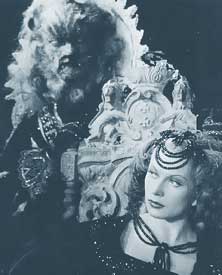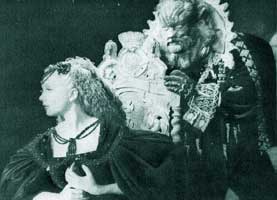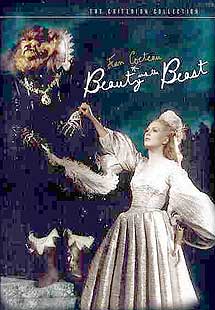"The film unwound, revolved, sparkled inside of me,
solitary, unfeeling, far-off as a heavenly body."
-Jean Cocteau
(1889-1963)
 I hadn't seen Beauty & the Beast (La Belle et al Bete, 1946) in perhaps fifteen years. But throughout life I'd seen it at least a half-dozen times, probably more than that, & its gothic elegance had become part of my own innermost understanding of love & aestheticism. It is both horror, & romance, & I have forever seen the world in just that entwined manner of madness & beauty, anger & love, horror & paradise.
I hadn't seen Beauty & the Beast (La Belle et al Bete, 1946) in perhaps fifteen years. But throughout life I'd seen it at least a half-dozen times, probably more than that, & its gothic elegance had become part of my own innermost understanding of love & aestheticism. It is both horror, & romance, & I have forever seen the world in just that entwined manner of madness & beauty, anger & love, horror & paradise.
It was forever one of my top-ten favorite films & every time it played in the revival cinema, I'd go again to see it on a big screen. But fifteen years is long enough to have forgotten a lot of it & even to have gotten it mixed up in memory with other films of like theme. Upon receiving the Criterion Collection dvd with many Extras, I was most eager to revisit one of the greatest cinematic joys of my younger years, recovering what had faded from memory.
It was also great because incredibly Granny Artemis had never seen it. Never seen Cocteau's Beauty & the Beast! How great to be introducing her to such a treasure.
Imagine my surprise that when I started the film, the soundtrack had been eradicated & replaced with the most awful caterwauling stink-ass opera singing.
I was horrified! I also wondered if I was going senile, as I was absolutely certain the film I'd seen many times was no bore-your-ass-off singing fairy tale like Jacques Demy's puling Donkey Skin (Peau d'Ane, 1970) shot in smell-o-rama with the second worst singing on earth. The only thing worse was this monotonous cacophony ineptly dubbed to the lip movements of the cast of Cocteau's Beauty & the Beast.
After the build-up I'd given the film, Granny Artemis sat afraid to say anything, but I could tell by the just-sucked-a-lemon look on her face that she was duly horrified.
I said, "I guess I'm losing my mind. I've seen this film a lot of times, though not for many years, & I swear there was never singing in it. The dialogue seems right, but I just never knew there was an opera version."
I began tinkering with set-up features just in case this was an alternate track & I found the normal version of the film. What a relief. Turns out the world's worst soundtrack to any movie ever from the beginning of time was written by Philip "Cone-headed Squatsy" Glass, may he rot in hell with new age whistles & toots deafening him for eternity.
 Replacing Georges Auric's music & general soundscape by J. Lebreton on Cocteau's absolutely perfect masterpiece is like drawing mustaches on all the women in Vermeer paintings. Oh, such crimes are evil shameless egos willing to perpetrate in order to get their own stench all over things far, far better than their own. Replacing Georges Auric's music & general soundscape by J. Lebreton on Cocteau's absolutely perfect masterpiece is like drawing mustaches on all the women in Vermeer paintings. Oh, such crimes are evil shameless egos willing to perpetrate in order to get their own stench all over things far, far better than their own.
As soon as the voices of the actual actors & the original musical score were restored to the film, suddenly it was once more the magical work of art I'd fallen in love with in my younger years.
The story is ultra-familiar: A travelling merchant (Marcel Andre) trespasses upon the garden of the Beast, incurs its wrath, but spares the man's life long enough to visit his family a final time, with the merchant's promise to return & be destroyed.
Beauty to save her father's life returns in his stead. Of course the Beast does not kill her, & she slowly comes to see past his exterior &, by loving him, restores his lost humanity.
Upon this court fairy tale by Madame Jeanne Marie Leprince de Beaumont (1711-1780), Cocteau has layered a sensual aesthetic gloom of such visual charm, & such honest emotionalism, that it is simply unexcelled as cinamatic art.
He adapted a style older than the film's 1940s vintage, a style seen in the most artful of silent cinema, pushed to new extremes of aestheticism with no hint of modernity. Though chalk full of special FX, they draw exclusively off the simplest filmic technologies, relying on visual poetry rather than pyrotechnics. And we may never in this world have another film of fantasy so perfect until & unless there is a "movement" to jettison computer graphics from the filmmaking process.
Cocteau was influenced by Flemish master painters as well as by silent film techniques. His vision was assisted by illustrator & costume & theater designer Christian Berard (1902-1949) aka "Bebe" who captured the mysticism of the tale in every object or ruffle. He was a member, as was Cocteau, of the homosexual arts community having co-founded with his lover Boris Kuchno Ballet des Champs Elysee, Boris choreographing, Bebe designing the costumes & sets.
 And Cocteau was equally assisted by cinematograher Henri Alekan (19092001), who was something of a hero of the Resistance, whose eye successfully gazed into the depths of dreamy romanticism, capturing the phantasmagoric in light in shadow. Alekan liked complex moving angles but Cocteau demanded a simple almost static approach to Beauty & the Beast, so it became Alekan's contribution to infer visual momentum for motionless shots. And Cocteau was equally assisted by cinematograher Henri Alekan (19092001), who was something of a hero of the Resistance, whose eye successfully gazed into the depths of dreamy romanticism, capturing the phantasmagoric in light in shadow. Alekan liked complex moving angles but Cocteau demanded a simple almost static approach to Beauty & the Beast, so it became Alekan's contribution to infer visual momentum for motionless shots.
Josette Day though at first a faint figure of "mere" Beauty rises to the occasion of heroic love, her delicate appearance disguising the fearlessness of compassion.
Jean Marais as the Beast is the ultimate romantic werewolf, love & pain in his white eyes, terror in his fangs, clad in as princely a manner as the monstrous can hope to achieve.
Many (including most famously Greta Garbo who cried out at the end of her viewing, "Give me back my Beast!") have thought it unfortunate rather than a happy ending that Cocteau's or Madame Leprince de Beaumont's Beast lost his uniqueness, lamented his becoming a mere human being at the end. But the bittersweetness of the happy-ever-after is there even in Cocteau's own subtext.
When Michael Bishop wrote his version of this tale -- "The Monkey's Bride," originally for an anthology I edited (Heroic Visions, Ace Books, 1983) -- it is Beauty who nearly destroys but then comes to recognize the Beast for who he is, thereby herself being transformed into a fellow beast, in the most open-hearted aesthetic manner.
Beauty & the Beast holds within it the world as viewed by a child, & the world as viewed by the greatest philosophers & prophets. Any search for subtexts will provide a goldmine of scholarly interpretation: symbolist, Freudian, philosophic, religious, dream, even historic since it was written & filmed & acted in the wake of horrific warfare at the beginnings of a new liberation.
Whatever one seeks or stumbles upon in this film, on the surface or in its depths, are all equally true & untrue, for art of this degree of refinement has in whatever the individual viewer's spiritual need requires.
copyright © by Paghat the Ratgirl
|

